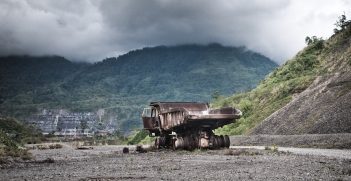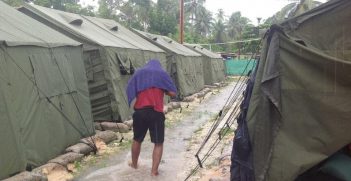West Papua’s Violence Without Solution
As violence escalates in West Papua, Indonesian political leaders have turned to the military to address what is a political issue, while West Papuan leaders call for dialogue without response. Neither approach is likely to end the half-century-long conflict.
While the rest of Indonesia has undergone significant political reform over the past two decades, little has changed in West Papua but for an increase in available wealth under a 20-year-old “special autonomy” arrangement. Increased wealth has led to a further influx of migrants from the rest of Indonesia and greater financial capacity for the West Papua National Liberation Army (TPNPB) to buy weapons. This has proven to be an explosive combination.
Despite generating massive wealth, including increased flows into some sectors of West Papua’s economy, the territory continues to have Indonesia’s lowest level of development and greatest poverty. With close to half of West Papua’s population being non-Melanesian and tending to live more privileged lives than their indigenous counterparts, most Melanesian West Papuans are left with extremely low levels of human development. Attempts to further “develop” West Papua, usually to the benefit of non-Melanesians, has only generated indigenous hostility.
The latest convulsion of violence follows the TPNPB ambush killing of Indonesia’s West Papua head of intelligence, Brigadier General Danny Nugraha Karya, in the central highlands district of Puncak Jaya in late April. He was in the region investigating the TPNPB’s recent killing of two teachers and a driver, who claimed they were Indonesian spies.
The TPNPB has not resiled from the attacks, with regional operations commander Gusby Waker saying the organisation will continue to kill suspected spies. These killings and the destruction of two schools and a helicopter follow an escalation of attacks by both the TPNPB and Indonesian security forces over the last two or so years, marked initially by the TPNPB’s massacre of more than 20 construction workers in December 2018.
Amnesty International Indonesia has also identified more than 80 victims of extrajudicial killings committed by Indonesian security forces in West Papua since early 2018. Indonesia has now deployed more than 400 extra soldiers from the 315/Garuda Battalion (known as “Pasukan Setan,” or “Satan’s Troops”) to the area, following an order by President Joko Widodo.
TPNPB spokesperson Sebby Sambom responded to the government’s military operation by saying, “TPNPB is ready … We are standing on our own land. Indonesia with the TNI and police are the thieves coming to steal our natural resources while killing us.” Sambom and Chairman of the United Liberation Movement for West Papua (ULMWP) Benny Wenda have called for dialogue with President Widodo.
However, Indonesia’s recent labelling of the TPNPB as “terrorists” has effectively closed off the possibility of dialogue to end the escalation of violence. In response to the killing of Indonesia’s regional intelligence chief, Indonesia’s upper house (MPR) Speaker, Bambang Soesatyo, said of the TPNPB that the security forces should “Just eradicate them. Let’s talk about human rights later.”
Indonesian police have also increased their tempo of arrests of non-military pro-independence figures. Spokesman for the civilian West Papua National Committee, Victor Yeimo, was the latest of a number of Papuans to have been detained on alleged treason charges in relation to widespread protests in 2019, in which up to 59 West Papuans were killed and more than 15,000 non-Melanesian residents fled to other parts of Indonesia. Yeimo had joined with other West Papuan leaders in calling for negotiations between the West Papuan independence movement and Indonesia’s government.
As well as direct dialogue, West Papuan independence leaders have also been calling for UN intervention in the troubled territory. West Papuan independence leaders point to the fundamentally flawed UN- supervised 1969 “Act of Free Choice,” in which 1026 hand-picked West Papuan leaders were compelled to vote for integration with Indonesia. This, they say, provides the moral and legal foundation of their claim to independence.
The UN has, however, not shown interest in revisiting that outcome. No major power has supported the proposal, for fear of angering the strategically important Indonesia. Even Indonesia’s former colonial masters and architects of a still-born West Papuan independence, the Dutch, have shied away from revisiting the 1969 process. This is despite various estimates suggesting that well over 100,000 people have died since the conflict began.
This then starts to point to the intractability of the conflict. Calls for dialogue are regularly ignored, and demonstrations in favour of independence within West Papua are invariably met with heavy-handed responses, with the military largely acting with impunity. This in turn continues to fuel aspirations for independence and provides a steady flow of recruits for the TPNPB.
Yet the TPNPB’s violent attacks have only strengthened the hand of Jakarta’s hard-liners and deepened even moderates’ aversion to dialogue. The rest of the world looks on, to the limited extent it does, with strategically limited concern and little to no desire to encourage Indonesia to meaningfully address its West Papua problem. Despite a compelling need within the territory, it appears that little will change in West Papua for the foreseeable future.
Damien Kingsbury held a Personal Chair and a former Professor of International Politics at Deakin University. He has written on developing country issues for the past four decades and is the author of Separatism and the State, Routledge, UK, 2021.
This article is published under a Creative Commons License and may be republished with attribution.





